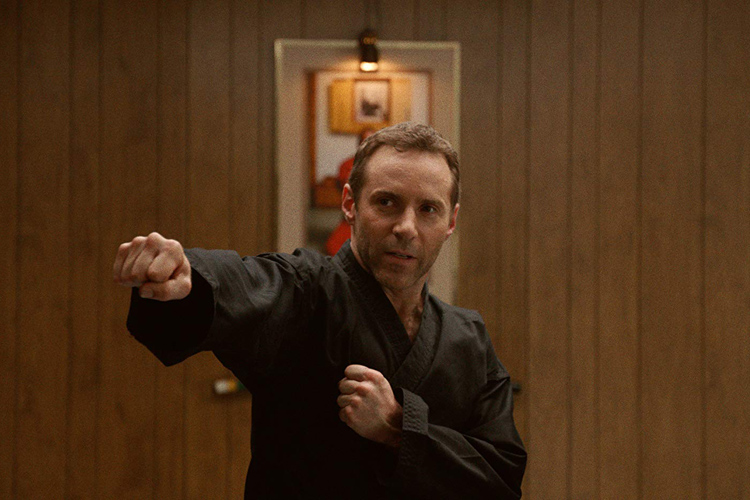If you’re tired of all the live-action Disney remakes, fear not: The Art of Self-Defense is an original film, not a remake of the 1941 Disney short starring Goofy the dog. In fact, The Art of Self-Defense might be the furthest thing from a Disney movie. Riley Stearns’ second feature is a dark comedy about toxic masculinity and karate, topped off with an unhealthy dose of violence. Goofy wouldn’t last ten seconds in this dojo.
Jesse Eisenberg stars as Casey Davies, a timid accountant whose only friend is his dachshund. One night, as he’s buying food for his canine confidant, he’s viciously attacked by a motorcycle gang and left for dead. When he wakes up alive and feeling pathetic, he decides that it’s time to learn the discipline of self-protection—or whatever you’d like to call it. It doesn’t take long for an eccentric sensei to lure Casey into his karate class.
The ensuing events spiral into strange territory, but Stearns’ screenplay makes the world feel off-kilter from the very beginning. In a manner comparable to the performance direction of Yorgos Lanthimos (especially his earlier efforts), Stearns has all of his actors speak with deadpan literalism, vocalizing their subtext into pokerfaced text. Lanthimos does this to strip human nature bare of its adornments and uncover the absurdity beneath; Stearns’ style serves a similar purpose, but it’s exposing a far narrower target: “tough guy” masculinity. Throughout The Art of Self-Defense, sensei and his devotees speak aloud the misogynistic claptrap that men usually hide in dark corners of the Internet.
Stearns excels at weaponizing their grossness into “laughing at them, not with them” comedy. As their male cruelty rears its ugly head, it becomes increasingly clear that Casey and company are using toughness as a safety blanket, making them easier to mock—and the movie keeps its violence at a comfortable enough remove from reality to prioritize laughs over shock. In a world where laughing at threatened masculinity could get (and has gotten) people killed, The Art of Self-Defense offers a hilarious space for doing so free of consequence.
The movie doesn’t do much more than that, though. The story—which occasionally fancies itself a thriller—is persistently predictable, which rids the proceedings of tension. The comedy, while consistently very funny, is essentially telling the same joke over and over—toxic masculinity is a fun thing to skewer, but after poking holes in it for over an hour, you get the sense that there’s no meat left to cover. Earnest exploration of toxic masculinity could’ve freshened up the repetitiveness, but The Art of Self-Defense is content to just point its finger and laugh. Again, the subject is perfectly deserving of that, but the game grows tired after a while.
The movie’s similarity to Fight Club also weakens its impact. Some dialogue and plot points are nearly identical to Fincher’s tour de force, making comparison of the two inevitable. In that match-up, The Art of Self-Defense’s black comedy comes up short: Stearns’ jokes may be dark, but they’re all clearly written as jokes, meant to provoke an immediate response. Fight Club achieves a more refined level of satire: comedy so uncomfortable that you question your desire to laugh. Of course, they’re different movies aiming for different things, but The Art of Self-Defense is so alike Fight Club that it’s hard not to recognize what the former could’ve done more effectively.
Still, it’s one of the more daring and funny indies of the year, and the performances at its center are absolute comedy gold. The Art of Self-Defense may be a one-note movie, but it sustains that one note with alacrity.
★★★½ (3.5/5)




